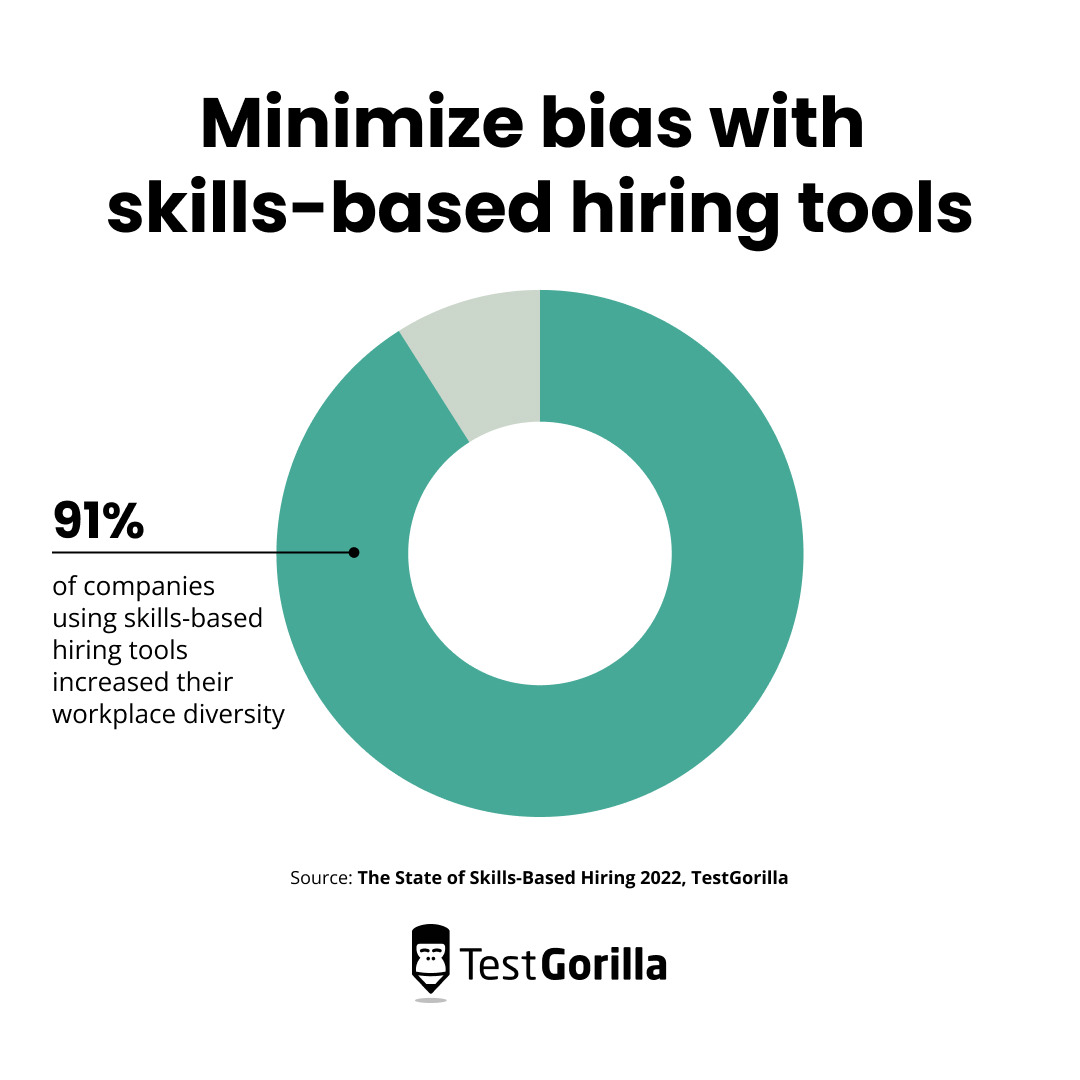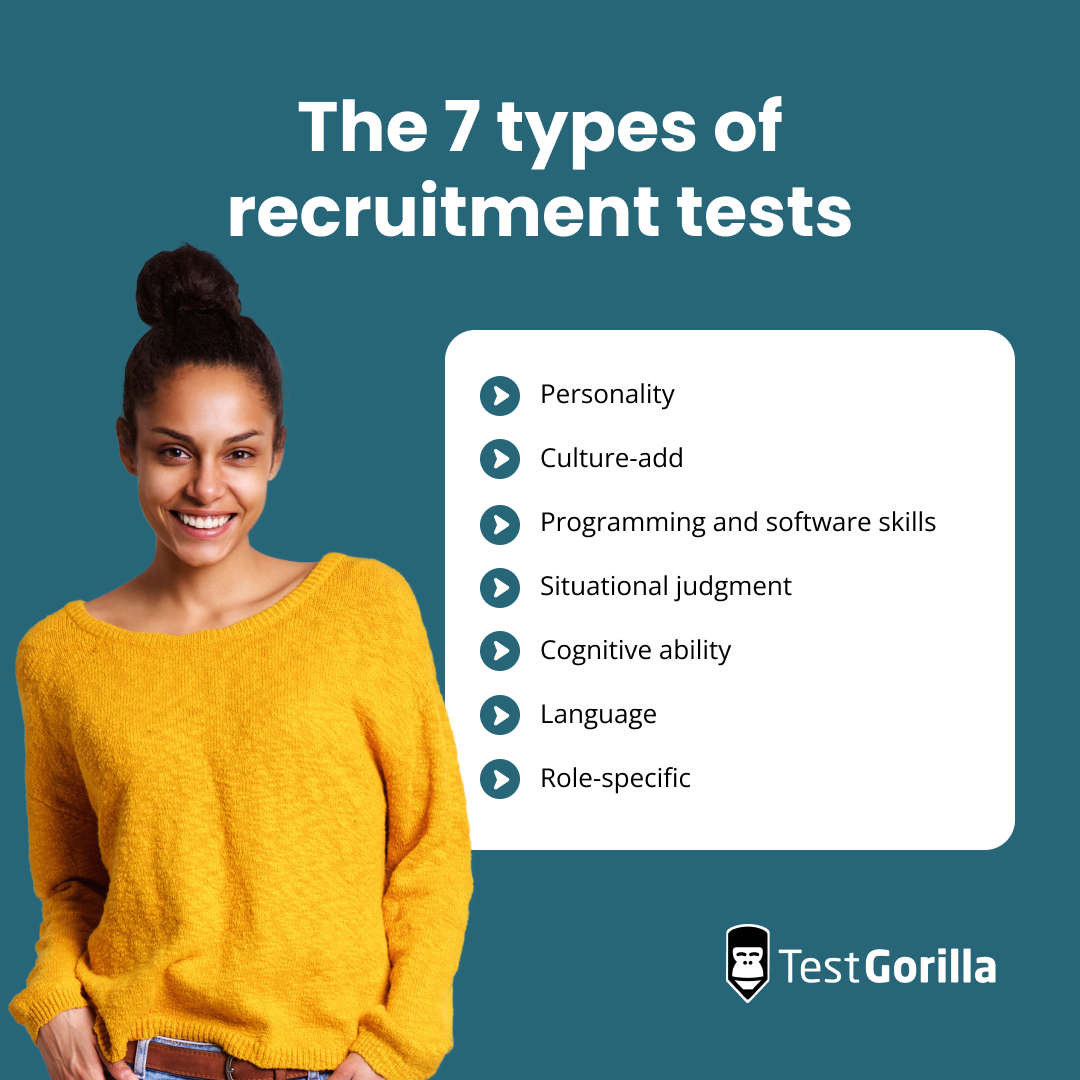7 recruitment tests to include in your campaign
With increasing demands for skills-based hiring from employers, employees, and job-seekers, it’s important to understand the crucial role that recruitment tests play in the process.
Recruitment tests focus on candidates’ provable skills and abilities instead of inaccurate, bias-prone strategies like degree and resume requirements.
But what’s test recruitment and how can it benefit your organization?
Below, we’ll explore what recruitment tests are, why you should use them, and the seven types of recruitment tests to include in your multi-measure talent acquisition strategy.
What are recruitment tests?
Recruitment tests are objective, multi-measure assessments that evaluate job candidates’ hard and soft skills.
They are an important part of pre-employment skills testing. This is because they help to determine whether a candidate has the right skills, abilities, and personality to perform well in a particular role.
There are many different types of tests that you can use in your recruitment process, including Personality tests, Culture-Add tests, Cognitive Ability tests, Role-Specific tests, and more. We’ll cover each in more detail – and explain the value they offer – further on in this article.
Why use recruitment tests?
Recruitment tests are a skills-based hiring practice with several significant benefits to the talent acquisition process.
They offer objective, in-depth data about a candidate’s skills. They also reduce time-to-hire, cost-to-hire, and bias in hiring.
Let’s take a closer look at why organizations should use recruitment tests.
Reduce time-to-hire
Recruitment tests have a positive impact on hiring speed because they cut the time it takes to assess a candidate’s skills and abilities.
Instead of wasting time and resources screening resumes and inflating the worth of degrees, recruiters and hiring managers can offer a recruitment test at the beginning of the hiring process and measure candidates’ results to identify top performers.
Depending on the role, recruitment tests can also replace traditional, time-consuming interviews with structured interviews. This reduces time-to-hire because structured interviews require less time and resources to conduct than unstructured interviews.
Lower cost-to-hire
Recruitment tests lower recruitment costs like recruiter fees, resume screening software, and interview costs.
Instead of paying external recruiters who are unfamiliar with your organization to evaluate your candidates, you can use skills tests – a cheaper, faster, and more accurate predictor of job success.
Although resume screening software may seem like it's worth the investment, it’s cheaper and more reliable to measure a candidate’s actual ability to do the job. Resumes offer little to no proof that a candidate has the skills to perform well, increasing the chance of making a costly bad hire.
Minimize bias
Recruitment tests also help minimize unconscious bias in your hiring process because they only focus on a candidate's skills and abilities – not their educational, cultural, or financial background.
TestGorilla’s report, The State of Skills-Based Hiring 2022, found that 91% of companies using skills-based hiring tools – like recruitment tests – increased their workplace diversity.
Boosting diversity has proven to increase organizational innovation, creativity, and productivity. Make sure to use a combination of recruitment tests to further protect your hiring process from bias.
The best insights on HR and recruitment, delivered to your inbox.
Biweekly updates. No spam. Unsubscribe any time.
Can you trust tests for recruitment?
You can trust recruitment tests to deliver clear, objective results about a candidate’s skills and potential to succeed in a role.
Although no single assessment method is foolproof, using a collection of multi-measure recruitment tests will help prevent inaccurate results.
In fact, research shows that pairing a structured interview with a skills test has the highest predictive validity. In other words, they are the most accurate combination for predicting a candidate’s future job success.
Which recruitment tests to use?
It’s important to identify any internal skills gaps before choosing a particular recruitment test for your hiring process.
Conduct a skills-gap analysis to determine whether you need to hire a new employee, the skills they may need to succeed, and how your organization can help develop them.
After you identify the type of candidate you need, use a combination of some or all of the below recruitment tests for an accurate, multi-level testing campaign.
The 7 types of recruitment tests
It’s important to evaluate a candidate’s technical skills in the hiring process. But what about their personality, behavior, and judgment?
Technical skills tests reveal what a candidate thinks about an industry-related process or concept, but what about how they think?
These seven recruitment tests are part of a holistic hiring process that gives recruiters a 360-view of the candidate.
Personality tests
These recruitment tests are used to identify and evaluate candidates’ personality traits.
Candidates respond to a series of multiple-choice questions and statements, which reveal underlying characteristics like motivations, communication style, temperament, character, and personal identity.
TestGorilla’s Enneagram Personality test, for example, maps out nine different personalities on a diagram – called an enneagram – to describe candidates’ core beliefs and worldviews. Specifically, the Enneagram test provides insights into a candidate’s approach to personal and professional relationships.
No type is better or worse than another, but before you interpret the results of an Enneagram test, it’s important to have a good idea of what type of personality your organization needs to grow and succeed.
Culture-add tests
Culture-add tests are recruitment tests that bring more objectivity and diversity to your hiring culture.
Instead of rewarding candidates who adhere to the status quo, they evaluate a candidate’s potential to expand your existing culture.
TestGorilla’s Culture-add test, for example, is an effective test recruitment tool because it can be customized to your company’s values and your open role’s needs.
Employers rate a list of values according to their importance for their culture as well as the behaviors that are important for the open role – such as analytical, diligent, helpful, etc.
Programming and software skills tests
Programming skills tests evaluate a candidate’s ability to use specific programming languages and frameworks, like Python, TypeScript, and Ruby on Rails.
These tend to be more advanced recruitment tests that consist of specific programming and problem-solving questions.
Software skills tests evaluate candidates’ knowledge of the software they’ll need to use in a particular role. TestGorilla’s Software Engineer test, for example, assesses candidates’ knowledge of the basic principles and topics of software engineering, like:
Linear and non-linear data structures
Algorithm analysis
Computer science fundamentals
Situational judgment tests
These recruitment tests are a type of psychometric test that evaluates candidates’ responses to a series of work-related questions and scenarios.
Questions on situational judgment tests are often multiple-choice, and test-takers are asked to choose what they consider to be the best responses to particular scenarios.
Situational judgment tests assess skills like:
Leadership
Resilience
Organization and planning
Decision-making
Communication
Our Business Judgment test, for example, evaluates a candidate’s ability to make the right trade-offs and decisions in different business scenarios. It’s an effective tool to hire business executives and strategy consultants.
Cognitive ability tests
Cognitive ability tests reveal how a candidate thinks by measuring a range of mental abilities like problem-solving, critical thinking, and numerical reasoning.
Cognitive ability tests are great predictors of job performance because they:
Evaluate a candidate’s agility in dynamic work environments
Assess a candidate’s ability to learn quickly on the job
Uncover raw intelligence that resumes can’t
Identify unique skills and abilities that indicate top performers
TestGorilla’s Critical Thinking test presents test-takers with inductive and deductive reasoning problems to identify candidates with strong critical thinking skills like:
Solving syllogisms
Interpreting sequences and arrangements
Grasping cause and effect relationships
Recognizing assumptions
Language tests
Language proficiency tests, as their name suggests, determine how fluent an applicant is in a particular language.
They give employers a general baseline of different language proficiency levels and conclude whether a candidate can perform necessary job-related tasks in the desired language. These levels are established by assessing key language skills like:
Reading
Writing
Listening
Speaking
Our English Proficiency test C1 evaluates a candidate’s ability to communicate at the C1 level of the Common European Framework of Reference for Languages.
This recruitment test is a great tool for hiring editors, writers, content creators, customer success managers, and any other role where English language proficiency is required.
Role-specific tests
Role-specific skills tests assess candidates’ skills and knowledge that are directly related to a specific role. They are useful for businesses of all sizes because they measure a candidate’s specific knowledge level in their industry.
For example, TestGorilla’s Legal Assistant (US) Online test evaluates a candidate’s ability to support attorneys and law firms in the United States, covering skills like:
Conducting intakes
Filings and preparations
Managing clients
Professionalism
Role-specific tests are an important part of skills-based hiring because they only ask questions related to a particular role, preventing bias from entering the recruitment process.
Combine recruitment tests to hire top talent
Recruitment tests are the foundation of a strong skills-based hiring strategy because they use objective metrics to identify and hire the right talent for your organization.
Test recruitment is a proven method to reduce time-to-hire and cost-to-hire while minimizing bias. To get the most accurate and unbiased results from recruitment tests, use a combination of the seven recruitment test types.
Want to gain hands-on experience with multi-measure recruitment tests? Explore TestGorilla’s extensive test library, or sign up for a free 30-minute live demo.
You can also check out our guide to 10 best practices to apply skills-based hiring in your organization.
You've scrolled this far
Why not try TestGorilla for free, and see what happens when you put skills first.




















